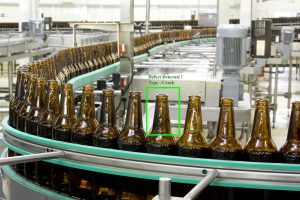In manufacturing, faults and defects on products inevitably occur from time to time. Industrial inspection, then, becomes critical. In this regard, AI can play a significant role.
Needless to say, the industrial internet of things, or Industry 4.0, has gathered momentum among manufacturers worldwide. With connected devices and the data they generate, IIoT helps achieve further automation and efficiencies for manufacturers.
A n important component under IIoT is machine vision, which entails the inspection of products by way of machines instead of the human eye. With artificial intelligence, machine vision can learn more quickly and effectively, helping manufacturers pinpoint defects in a timely and accurate fashion.
n important component under IIoT is machine vision, which entails the inspection of products by way of machines instead of the human eye. With artificial intelligence, machine vision can learn more quickly and effectively, helping manufacturers pinpoint defects in a timely and accurate fashion.
One company that is dedicated to AI-powered visual inspection operations is Neurala, which is tasked with the mission to “make AI more accessible and apply our groundbreaking technology to use cases where customers will see real benefit and cost savings,” said Max Versace, CEO and Co-Founder of Neurala.
The company’s core product is the Brain Builder software, which allows the customer to create custom vision AI inspection solutions in an all-in-one platform for data tagging, training, deployment and analysis. Brain Builder is built upon Neurala’s Lifelong-DNN (L-DNN) technology, which reduces the data requirements for AI model development and enables continuous learning in the cloud or at the edge.
“Traditional approaches to deep learning made continuous learning of AI impossible because the environment is always changing. With L-DNN, AI is able to learn quickly, at the edge/on-device, and continuously overtime. This means that when a tough, previously unseen use cases is encountered where AI does not perform well, L-DNN can learn that quickly and become more precise,” Versace said.
How manufacturers can benefit
According to Versace, the combination of Brain Builder and L-DNN can benefit users in manufacturing, especially in visual inspection applications. “A unique aspect of our technology is its ability to detect anomalies or ‘bad’ products. In settings such as manufacturing where factories are producing consumer goods, sheets of metal, or machine parts, detecting defects can be tricky because there are many examples of functional good products, but very few of the bad. Systems are typically trained to recognize what a ‘good’ product looks like, and when it encounters something that does not look good, it becomes ‘nothing I know,’ or an anomaly,” he said. “With Brain Builder, an AI system would be able to identify this anomaly, and alert teams, so that the situation can be handled appropriately. And an operator can do this without knowing a thing about AI.”
Neurala’s solution has helped them win the trust and business from various manufacturer customers. “Earlier this year we announced a partnership with IHI, one of the largest manufacturers in the world. Our automated visual inspection platform is being deployed as a key component of IHI’s workflow, enabling more efficient industrial inspections,” Versace said. “Beyond manufacturing, we are also working with partners like Badger Technologies in robotics and AviSight and Optelos for drone inspections. In addition, because our vision AI solution is so cost effective, our sales team works directly with end user customers in these industries.”
According to Versace, the company is not limited to any specific geographic region but is primarily focused on North America, Europe and Asia. “As the manufacturing/industrial industry is really where we are looking to expand, we are targeting the regions where these companies already exist. IHI for example is based out of Japan, and then we are working with several other European-based manufacturers as well,” he said.
Article originally published on https://www.asmag.com/showpost/31265.aspx

